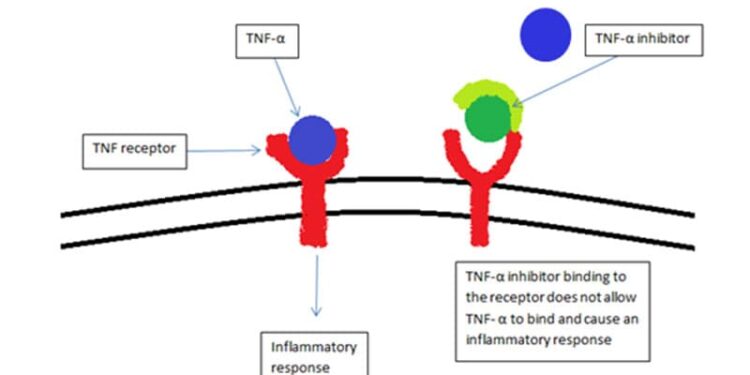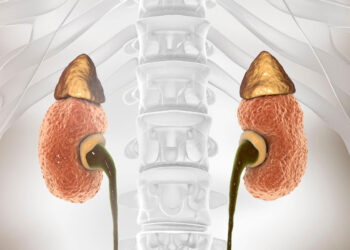TOPLINE:
Older age at TNF alpha inhibitors initiation, a diagnosis of juvenile idiopathic arthritis (JIA), and concomitant immunomodulator use were associated with delayed onset of paradoxical psoriasiform dermatitis (PD) in children treated with TNFi, in a retrospective chart review.
METHODOLOGY:
- Researchers conducted a retrospective chart review of 3418 patients receiving TNFi therapy for various conditions (including Crohn’s disease, JIA, and ulcerative colitis) at Cincinnati Children’s Hospital Medical Center, Cincinnati, from January 2018 to January 2023.
- Overall, 70 patients (2%) developed PD skin eruptions (52.9% women; 91.4% White; 5.7% Black; median age at TNFi initiation, 11.7 years; median age at PD onset, 13.6 years); 21.4% of patients were given concomitant immunomodulators; 94% of patients had PD at multiple sites. The median time from starting a TNFi to the onset of PD was 16.9 months.
- Treatments for PD included topical steroids (85.7%), systemic medications (15.4%), and nonsteroid topicals including tacrolimus, pimecrolimus, and calcipotriene (24.3%).
- PD outcomes and factors associated with its severity were evaluated.
TAKEAWAY:
- PD rashes resolved in 32 patients (45.7%); the median time to resolution was 15.5 months. Most (71.4%) of those with PD had Crohn’s disease, and infliximab (52.7%) and adalimumab (44.6%) were the most frequently used TNFi.
- The initial TNFi was discontinued in 40 patients (57.1%) because of PD in 23 (57.5) of those patients. Of these 40 patients, 12 (30%) switched to another TNFi with a 33% recurrence rate, while 25 (62.5%) switched to a different medication class with PD persisting in 36%.
- Girls were more likely to receive high-potency topical steroids, possibly indicating a difference in prescribing practices or worse disease.
- Onset of PD occurred later in patients with JIA (coefficient estimate [CE], 22.6 months; P = .02), those on concomitant immunomodulators (CE, 11.0; P = .04), or those who were older when the TNFi was started (CE, 2.4; P < .01).
IN PRACTICE:
“Our study found that the diagnosis of JIA, older age at TNFi initiation, and concomitant immunomodulation are potential predictors of later PD onset,” the authors of the study concluded. “Female sex may influence PD severity,” they added, “but conflicting results and the retrospective design of this study call for additional research to better understand the factors contributing to PD severity in pediatrics.”
SOURCE:
This study was led by Muayad M. Shahin, University of Cincinnati College of Medicine, Cincinnati, and was published online on July 31, 2025, in Pediatric Dermatology.
LIMITATIONS:
The retrospective study design limited the availability of detailed morphologic descriptions. Additionally, multiple definitions of severe PD restricted analysis of risk factors across different outcome measures.
DISCLOSURES:
This research was funded by the National Institute of Arthritis and Musculoskeletal and Skin Diseases Core Center and the University of Cincinnati Office of Research medical student summer research award, funded by the Stella and Carey Wamsley Charitable Trust. One author disclosed serving as a consultant for LEO Pharma. The other authors reported having no conflicts of interest.
This article was created using several editorial tools, including AI, as part of the process. Human editors reviewed this content before publication.
Source link : https://www.medscape.com/viewarticle/factors-affecting-tnf-inhibitor-induced-psoriasiform-2025a1000l6w?src=rss
Author :
Publish date : 2025-08-11 05:12:00
Copyright for syndicated content belongs to the linked Source.











